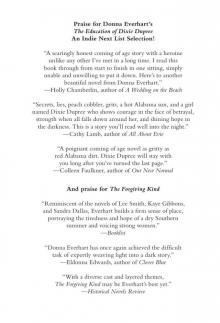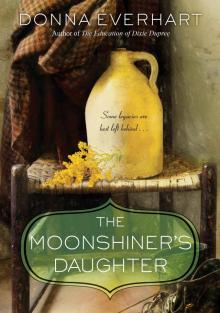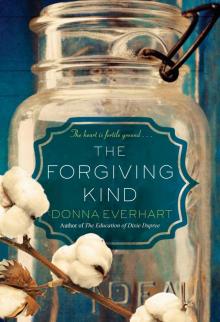- Home
- Donna Everhart
The Moonshiner's Daughter Page 3
The Moonshiner's Daughter Read online
Page 3
He was right. Unlike Uncle Virgil, Daddy handled finances carefully. We had electricity that didn’t get shut off, that TV he was still so proud of, and a bathroom with running water, sink, tub, and a toilet. While our house was old and dilapidated on the outside, and needed a paint job, that was for appearances only. He had money to do anything, but he let it set ramshackle and run-down on purpose. While everything was nice inside, he made sure we came off as dirt poor to anyone coming up the drive, meaning if there was a raid, we sure didn’t look the part of successful bootleggers. Junk was piled up in the yard. Tires, parts to tractors long gone, an old lawn mower, the rusty fender off of one of them running cars, other odds and ends.
He drove a beat-up Ford truck about town and it was what he let me and Merritt drive too. He didn’t care if it got accidentally backed into a tree, which Merritt had done a few times when he was about eight and could barely see over the back seat. Sally Sue was a whole other matter. That was a hulking tank of a car and in good shape. It was so fast, he was a blur going down the back roads of Wilkes County. He kept her out of sight behind the house in an old shed.
“Can’t you ask for a raise?”
He gave a short laugh. “That forty bucks is with the raise I got earlier this year. It ain’t nothing to be ashamed of, Jessie, what we do. Our family’s been doing it a long time.”
“If there’s nothing wrong with it, why’re we always sneaking around?”
I glared at him, and it was like one of them old Westerns, locked in a standoff, one or the other about to pull the trigger. He was about sick of me and my constant rub, like a pair of shoes that didn’t fit. He stuffed the bill back in his pocket and walked back outside. A few minutes later his truck went down the drive, on his way to the job in Wilkesboro, and we had to get to school.
I said, “Maybe I’ll just quit eating then.”
Merritt got up, a disgusted look pulling his face down. “You ain’t never gonna stop.”
He went to get his books while I started thinking about me sitting at the table with my empty plate in protest. Food I would have surely cooked passed right under my nose. Mashed potatoes the way I liked, creamy with little pools of warm butter. Fried chicken on a platter, crispy and hot, and beside it, another bowl filled with rich, brown gravy. Fresh corn. Tomatoes. Warm biscuits and pear preserves. My stomach growled. There happened to be a chocolate pie sitting on the lower shelf in the refrigerator. I opened the door and bent down to swipe my finger through the whipped cream.
From behind me came, “I told you so.”
Embarrassed, I straightened up and said, “It ought not to matter to you what I do or don’t do.”
“It don’t.”
Merritt went outside, and I stared at the pie a second longer before I shut the refrigerator door. I picked up my books and followed him. He was already at the end of the drive, and when I approached, he kept his back to me like I wasn’t there. It was April, and still cool with the sun not giving much warmth, but suddenly, I was hot. I ain’t embarrassed, I told myself, while knowing very well my own brother was ashamed of me because I was fat. The bus pulled up, and the doors swooshed open. He bounded up the steps and had a choice of sitting with Curt Miller, or Abel Massey, his best friends. I searched for Aubrey Whitaker, and when I saw her she slid over, patting the spot next to her. Relieved, I dropped into it, and didn’t speak.
She said, “What is it?”
She had large brown eyes like a fawn, silky black hair cut in a bob and always perfectly rolled in a pageboy. She was thin as a vine. Aubrey had been my friend since we were seven years old. They’d moved here from Charlotte, when her daddy accepted a position as the minister at the Shine Mountain Episcopalian church. As we’d grown older, I began to see how different it was in her family, how they led a respectable life, with her father steering his congregation to Jesus, and her mama, sweet and kind, if a little strange. I’d sometimes wished I was Aubrey for all them reasons, but mostly because she didn’t look like me. To her question, I shook my head.
She insisted, like I knew she would. “What?”
“Just the usual.”
“You want to talk about it?”
She reminded me of the school counselor sometimes.
“Not really.”
She huffed loudly and flipped her hand. When I got grumpy, she got impatient. We gazed out the window, neither of us speaking. While I usually told Aubrey everything, I’d never before talked about how I was unhappy with myself. I was afraid she’d get to thinking maybe I was right. That her time ought not be spent with the likes of me, and then she wouldn’t want to be my friend, and where would I be? Trying to find a seat on the bus, and eating my lunch at a table by myself, like scary Darlene Wilson with eyes black as night, who spent most of the time hissing and talking to herself and whose mama was said to be off her rocker.
The bus finished with stops and picked up speed as it went along Highway 18 toward Piney Tops High School. Other girls seated toward the front laughed without a care. There they sat with their brilliant white bobby socks rolled down to show slim strips of legs tanned from helping with family crops and gardens. Their crisp ironed skirts and dresses made them look cool, and clean. They laughed and twirled gleaming pieces of curled hair, as carefree as leaves on the wind. I couldn’t imagine any one of them doing filthy work like stirring sour mash.
My mood darkened.
Aubrey pointed at Cora McCaskill and said, “Gosh, she’s got on enough makeup today.”
Cora had turned around in her seat to talk to the girl behind her, and from where we sat, it was easy to see the blue eye shadow clear up to her eyebrows. She was very popular, and could get away with it. She wore new penny loafers, the copper coins glinting like she’d spent a few hours polishing them. Her daddy was one of the richest people in North Wilkesboro. He owned a car dealership and his commercials played on the TV all the time.
Aubrey stared at her intently. “Whore of Babylon.”
She would think that. She wished she could wear makeup, but her strict religious daddy wouldn’t allow it, and she resented anyone who could.
She repeated herself, and when I didn’t respond she said, “I bet I know why she’s popular.”
I still didn’t reply and we rode for a while with me watching Aubrey watch Cora.
I finally said, “I might go on a diet.”
Her attention shifted back to me. “Huh? Why?”
Exasperated, I said, “Ain’t it obvious?”
She leaned toward me, and in a hushed voice like she didn’t want anyone to hear she said, “Daddy doesn’t eat for days at a time on occasion, usually when he’s seeking knowledge and enlightenment.”
“Enlightenment.”
“Yeah, you know, insight to a problem. It’s called fasting.”
Aubrey and her family were different, mainly because her mama came from California and was a bit of a nut ball in my opinion. She practiced something called yoga. I didn’t know a soul who’d ever thought of twisting themselves into such a tangle, but her mama did and I’d watched her a time or two. Said she was exercising. She ate peculiar stuff too. I’d once seen her crack open a couple eggs and swallow them raw. As soon as I’d said it, I began to rethink my declaration. Aubrey’s enthusiasm would only lock me into something I’d blurted out to get her attention.
I said, “I don’t know. I’m just thinking about it.”
Once you talk about a thing, it’s like a commitment, and before you know it, you’re getting asked, Have you started yet? and, Why not? I went back to looking out the window, wishing I’d not brought it up, unsure I could hold myself to it.
Chapter 3
The smell of steak and gravy. The sound of forks scraping plates. Even their chewing. All of it grated, as I sat with a glass of water before me, reading the Wilkes Journal-Patriot while trying not to stare at their loaded plates. I was looking at the front page where it showed Senator John F. Kennedy at some campaign rally in West Virginia with his br
other Bobby by his side. They were interesting-looking people, but what the article said wasn’t enough to keep my mind off what was going on around me. I’d somehow found the fortitude to do what I’d told Aubrey, and had survived twenty-four hours on water alone. It wasn’t easy watching them eat and my attitude was a little more than sour at this point. The day before, when I’d told Aubrey about dieting, Daddy had come home that night and pointed about how he’d bought the food we were eating with that “good ole bootleg money.” He and Merritt laughed while I shoved my plate aside, got up, and started washing the pots and pans. Daddy had tried to get me to sit back down.
“Jessie. Jessie, come on, I was only playing.”
I kept my back to them, pictured the meat gone green, the squash and butter beans flecked with rodent hair, the biscuits filled with mealworms. The decision was mine to own, and if Aubrey’s daddy got himself enlightened, maybe I’d get answers for my own self.
This second night was harder though. I set the paper aside, got up, and began washing. Both had finished, but remained at the table. I removed their plates without making eye contact. The chair creaked as Daddy leaned back to relax.
He said, “I need you over to Blood Creek with Merritt, see how it looks while I make a quick run tonight.”
At the moment, I was not enlightened. I was light-headed and irritable.
My answer was short. “I got homework.”
“It won’t take long.”
“It’ll take long enough.”
He got up out of his chair, and as he left the kitchen he said, “Do as I say, Jessie.”
I so wanted that one last piece of steak and I’d been thinking about giving in and eating it until he said that. Merritt’s expression was gloomier than mine. With Daddy out of the room he didn’t need to say or do anything for me to know he was aggravated. It showed in the way he got up from the table, the chair shoved back harder than necessary. It was different between them. All Daddy had to do was tell him what he wanted done and Merritt acted like he couldn’t wait to get on it—but he had his own reasons. He’d been wanting to do the runs down the mountain and into the big cities, not just haul in supplies to the stills. Daddy was, at the moment, dead set against that notion mostly because of revenuers, and he sure wasn’t going to ask me, the wretched, disagreeable daughter. It was enough we had to ride with him as deterrents now and then, and he had to hear me complain about that on top of everything else.
Merritt waited by the door as I stacked dirty plates in the sink and turned on the hot water. He tried to act tough, but with a trace of milk on his fuzzy upper lip I could only view him as my baby brother while also seeing how much he resembled Daddy with his dark hair brushed back off his forehead.
Defiant, he said, “I can do what needs doing.”
“No you can’t. We both got to lift that cap off, and unload the corn, and it needs to be done quick.”
As we went down the back steps, he mumbled, “I don’t know why you got to think you’re so high-and-mighty all the time.”
I ignored him. We got in the truck and I took the keys out from under the seat. I drove Route 18, then a remote dirt path with a lot of switchbacks. It ran along Blood Creek, thus the name we used for the still. We had two other locations in Wilkes County, Big Warrior and Boomer, also named for the general areas they resided. We didn’t talk the entire fifteen-minute ride. I parked the truck out of sight under an old poplar. We each hefted a fifty-pound sack out of the back, balanced them on our shoulders, and began the walk in. We took a left on what could be called a trail until it dwindled away to nothing. From that point, the woods were dense, and we followed what had become familiar to us, but anyone else would swear they were lost. Certain trees appeared and we knew where to turn, then came the bend and wind of the creek, and we crossed it, carefully balancing the sacks. My leg muscles burned and went wobbly. I dreaded having to go back for the rest. It would take several trips and I was already exhausted.
I broke the silence and said, “It ain’t that I’m high-and-mighty.”
He was breathing hard, but had enough air to argue. “You act like what we do ain’t no good. I don’t see why you got to keep pushing the way you think. Whether you want to admit it or not, it’s why we got what we got.”
“You sound just like him.”
“I don’t care.”
“You should. It’s illegal.”
I’d given up trying to talk to him about Mama, and instead wanted him to see what we did was wrong. He’d only been two and didn’t have any recollection of her. He didn’t have a feeling of loss, a sense of missing out on something important and special like I did. Merritt plowed ahead like he didn’t want to hear any more. The way it was with Daddy and him, I was like a lone daffodil in the early spring that dares to find a way to poke through the frozen ground. I pondered my future as we went, like I did a lot these days. I wanted to get away from the legacy of my ancestors that was attached to me like my own skin, our last name synonymous with moonshine and bootlegging.
I didn’t want to be known as the moonshiner’s daughter.
As we approached the Blood Creek still, the very smell was as dishonest as a local politician. We set the bags on the ground, then squatted behind a big rock. We had us a perfect view of the ugly wooden contraption that sat festering in a stand of trees, near to a small offshoot of the creek. We assessed the surroundings. Nothing was out of the ordinary, so I nudged him and we went a bit closer. We stopped again, listening, and watching. After another minute, we moved until we were finally standing near enough that Merritt could look for what he, Oral, and Uncle Virgil set up the day before. There was a way of leaving the area so as to know if someone had been there. The easiest way was to lay a couple sticks like an X near the front of the still, and hide it with leaves. Some people tied threads so they’d get broke. He bent down and carefully swept the leaves aside. The X was still there, nothing appeared out of place, and the still was doing what it was supposed to, much to my disappointment.
We got the corn and stored the bags under the lean-to Daddy fashioned. The sun had set its edge at the tops of the trees, and the air was becoming cool. I could’ve used a jacket, especially in this heavily shaded area of the woods. Frogs and crickets began a steady serenade joining in with the late day twittering and calls of various birds. There was solitude here, the only thing I liked about it.
Merritt whispered, “Uncle Virgil’s supposed to bring more corn.”
A real family affair, I thought with sarcasm. I hoped we’d miss him. He would often show up reeking of liquor and either get into telling dumb stories about how he and Daddy were living their glory days like they were legends in Wilkes County, or he’d be moody, itching for a fight like he’d been the other day. Merritt pointed at the big box contrived from old boards and lined with copper. Blood Creek was a different type of still called a submarine. Daddy liked it best since he could get several runs of liquor off one mash recipe, and what we were checking on had been started a couple days ago. When spring hit, liquor making was nonstop. It only took three to four days for the mash to ferment, whereas in colder weather it could take up to two weeks. We were practiced and used our hands and facial expressions for communicating. Come evening, we were always more cautious. Revenuers were known to spring from out of nowhere, sometimes lying in wait after dark.
The boiler held the fermenting mash and Merritt made another sign indicating he was ready if I was. We lifted the lid covering a layer of bubbling foam. We swiped our hands through and studied it. It was close to the distilling stage, the head thinner. I held up a finger, estimating how many days it would take before the froth would disappear. It would only be beer at that point and about 6 to 12 percent alcohol. The mash would be heated and stirred to the boiling point of alcohol, 173 degrees. Steam would pass through a thumper and into a flake stand and out what Daddy called the “moneymaker.” We’d been shown how to shake the jars it trickled into, to get a bead, meaning if bubbles formed and disa
ppeared too quick, it wasn’t good for drinking yet. You want the bead to last longer. I was almost certain it was at some point during the heating process, when a fire is built underneath the boiler, that Mama had come to her end.
We replaced the lid, and made sure the X made with the sticks was covered well before we began making our way back down the path. We’d no sooner gotten started when an unexpected noise made me grab Merritt’s arm. There’d been a distinct cracking sound, like someone stepped on a branch. It hadn’t come from the direction I would expect, and I placed a finger to my mouth. We ducked behind a cluster of black haw to scan the darkening woods. The fading light created the appearance of someone hiding behind an oak, an edge of clothing visible. I was about to jab Merritt until I saw it was only a thick vine. I waited to see if I could detect any kind of unusual movement while Merritt cupped a hand around his ear. The creek running nearby wasn’t helpful in separating noises caused by nature versus man. After another few seconds, and again, the crunch of a footstep came.
I imagined what I’d heard about all my life; revenuers had finally caught us. They would sometimes get lucky and locate a still, then lie in wait for somebody to come back just so they could arrest them. They’d surround the area, prepared to tear apart what they found, and then put the responsible party in handcuffs, or in the case of their being underage, I wasn’t sure what would happen. Daddy wasn’t really a criminal, more like a tax evader, but I’d considered more than once he might end up behind bars and Merritt and I would be stuck living with Uncle Virgil and Aunt Juanita. There were times I was certain it would take something like that for him to quit and I’d even wished for it, until this moment. What would the agents do if they caught a couple of kids? Make us talk? We heard a hoot, like somebody signaling to another person. I was set to holler and run. Merritt’s eyes were like giant black marbles. I grabbed his arm and pointed. Something slid by the trees just to our right.

 The Moonshiner's Daughter (ARC)
The Moonshiner's Daughter (ARC) The Moonshiner's Daughter
The Moonshiner's Daughter The Forgiving Kind
The Forgiving Kind The Road to Bittersweet
The Road to Bittersweet